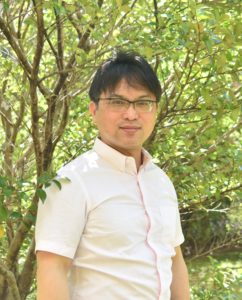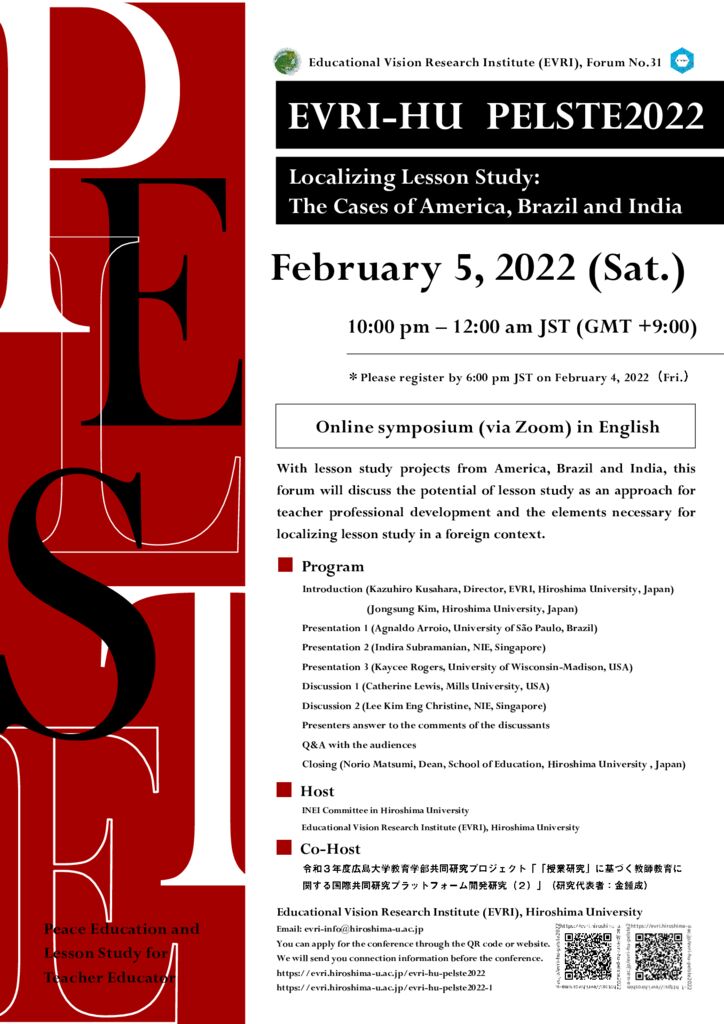2020年1月、教育ヴィジョン研究センター(EVRI)は,INEI加盟を記念して,また東アジアにおける教育学研究の拠点として,INEI加盟大学の研究者と連携を深める「Peace Education and Lesson Study for Teacher Educator 2020(略称:PELSTE2020)」を企画しました。これは、広島大学が強みとする「平和教育」と「授業研究」,そして「教師教育者の養成」に焦点をあててその成果を世界に発信する取組です。
翌2021年3月には,INEI加盟大学とのさらなる連携・交流を深める特別プログラム 「PELSTE2021」をオンラインで開催しました。PELSTE2021は,広島大学が「平和教育」と「授業研究」の国際的な(東アジアの)拠点として発展し広く認知されるように,海外の研究者に研究・教育の動向に関する最新情報の提供と研究交流のプラットフォームを提供すること,また参加者間の共同研究の芽を形成するとともに,次回PELSTE2022への関心と参加意欲を醸成し,3年後のINEI年次総会・広島開催に向けての地ならしとすることを目的として開催されました。加盟大学から推薦された若手研究者6名(アメリカ,ブラジル,カナダ,シンガポール,韓国の各加盟大学から推薦)が,EVRIが提供した事前研修教材を参考に,調査・研究してきた成果を発信しました。また,これからの「平和教育」と「授業研究」のあり方を国際的な視野から提案し,参加者と意見交換しました。
2022年度も,INEI加盟大学事業として「PELSTE2022」をオンラインで開催します。PELSTE2022は,授業研究(Lesson Study)に焦点を当てた企画となる予定です。このページでは,PELSTE2022の開催案内や資料の掲載,および成果の報告を発信していきます。

It is a great honor to host PELSTE 2022 online as the pandemic continues.
PELSTE was established with the aim of bringing researchers together to contemplate the objectives of peace education and lesson study in Hiroshima, a symbolic place in Japan.
Hiroshima is a treasure trove of materials for surveying peace and lesson study. PELSTE 2020 provided us with a deeper understanding of these materials by visiting, observing, interviewing, and discussing with participants. PELSTE2021 under the pandemic provided a variety of indirect experiential media in place of these activities; PELSTE2022 will provide an opportunity to share the lesson study practices and findings of researchers who have participated in past PELSTEs.
Hiroshima is a crossroad for inquiring about peace and lesson study. Through online dialogues, we hope that young scholars around the world will exchange their ideas of “peace” in the arena of education and share their methodology of studying as well as researching “lesson” from their cultural contexts and academic visions.
Hiroshima is an incubation initiative toward innovative peace education and lesson study. We expect PELSTE 2022 to encourage many researchers to visit Hiroshima in the future, strengthen ties with the faculty of Hiroshima University, and lead to further exchange of ideas for joint research projects.
We sincerely welcome you to PELSTE 2022. We look forward to meeting you online.
Prof. Dr. Kazuhiro Kusahara
EVRI-HU PELSTE 2022 Localizing Lesson Study: ■ Purpose ■ Date ■ Venue ■ Program ■Host ■Co-Host ■Fee: free ■English
The Cases of America, Brazil and India
With lesson study projects from America, Brazil and India, this forum will discuss the potential of lesson study as an approach for teacher professional development and the elements necessary for localizing lesson study in a foreign context.
February 5, 2022 (Saturday);22-24 (Japan); 21-23 (Singapore); 13-15 (London); 10-12 (Sao Paulo); 7-9 (Madison)
*Please register by 6:00 pm JST on February 4, 2022(Fri.)
Online symposium (via Zoom) in English
Introduction (Kazuhiro Kusahara, Director, EVRI, Hiroshima University, Japan)(Jongsung Kim, Hiroshima University, Japan)
Presentation 1 (Agnaldo Arroio, University of São Paulo, Brazil)
Presentation 2 (Indira Subramanian, NIE, Singapore)
Presentation 3 (Kaycee Rogers, University of Wisconsin-Madison, USA)
Discussion 1 (Catherine Lewis, Mills University, USA)
Discussion 2 (Lee Kim Eng Christine, NIE, Singapore)
Presenters answer to the comments of the discussants
Q&A with the audiences
Closing (Norio Matsumi, Dean, School of Education, Hiroshima University , Japan)
・INEI Committee in Hiroshima University
・Educational Vision Research Institute (EVRI), Hiroshima University
・令和3年度広島大学教育学部共同研究プロジェクト「「授業研究」に基づく教師教育に関する国際共同研究プラットフォーム開発研究(2)」(研究代表者:金鍾成)

On February 5, 2022, the Educational Vision Research Institute (EVRI), collaborating with the Internal Committee of INEI at Hiroshima University, held a symposium for Peace Education and Lesson Study for Teacher Educator (PELSTE). The purpose of PELSTE 2022 was to provide a platform for research exchange, so that the Faculty of Education, Hiroshima University can become an international (East Asian) center for “Peace Education” and “Lesson Study” in preparation for the INEI Annual Meeting to be held in Hiroshima after 2024. The symposium of PELSTE 2022, which focused on “Lesson Study,” was held with three participants and 92 audience members to discuss the significance and challenges of Lesson Study.
At first, Dr. Kazuhiro Kusahara (Hiroshima University), the chief of EVRI, and Dr. Jongsung Kim (Hiroshima University), the facilitator of the PELSTE 2022, explained the aim of the event. Understanding Lesson Study as a localized version of Japanese Lesson Study (Jyugyou Kennkyuu) based on the needs and context of individual settings, the two are not the same. Dr. Kim stressed the importance of listening to the three presentations from the perspective of what Jyugyou Kenkyuu and Lesson Study learn from each other.
The first presenter, Dr. Agnaldo Arroio (University of São Paulo), reported two lesson study cases: one project for science pre-service teachers and the other for elementary school teachers about teaching with ICT. Dr, Arroio mentioned that he adopted lesson study into teaching courses and professional development programs that he was in charge of. He reported that the most important learning of the participants was to understand the value of observing the lesson. He explained that, behind that learning, there were communities to support each other. In the case of Brazil, lesson study was a method to create a space for talking about lessons comfortably.
The second presenter, Ms. Indira Subramanian (National Institute of Education, Singapore), reported the case of her in-service teacher lesson study group in India. Ms. Subramanian, who wanted to share her learning about lesson study in PELSTE 2021 with educators in India, created a lesson study group with five in-service teachers in India. Her lesson study group run online designed a research lesson, observed the lesson via YouTube, and improved it together. Based on the data that she collected before, middle, and after the lesson study, she discovered that lesson study could develop an attitude to understand lessons flexibly and can deepen not only pedagogical knowledge but also pedagogical content knowledge.
The third presenter, Ms. Kaycee Rogers (University of Wisconsin-Madison), reported a professional development program that she adopted lesson study. Understanding that teachers in rural areas have rare opportunities to talk about lessons with colleagues professionally, she argued that online lesson study could solve the mentioned problem. Because it is an ongoing project, the result was not reported; however, she shared the details of the project, such as how the project tried to deliver the core feature of lesson study to the participants.
After the three presentations, the first discussant, Dr. Catherine Lewis (Mills University), commented on the value of lesson study that she discovered from the cases of America, Brazil, and India. One is to transform teacher education programs from content-focused to lesson-focused. The other is to create professional learning communities that educators as professionals of a lesson can support each other. Also, considering all the three casesd are implemented in online settings, she said it is important to understand the characteristics of online lesson study. Finally, Dr. Lewis mentioned the importance of institutional backup to maximize lesson study’s impact in individual settings.
The second discussant, Dr. Christine Lee (National Institute of Education, Singapore), compared and commented on the three presentations from the following perspectives: “What is the context of the cases of lesson study?” “Why did the teacher educators decide to adopt lesson study?” “What is the protocol of the lesson study?” Based on her analysis, she asked the following two main questions to the presenters: (a) “What core features of Lesson Study have you retained in your adaptation of Lesson Study in your contexts and why?” (b) “What changes would you make in your next iteration of Lesson Study?”
During Q&A time, audiences asked the following questions: “How did you incorporate the practice of lesson study in the teaching and learning routine (teaching and learning)?” “What type of virtual platforms were used to conduct Lesson Study?” “How can these challenges (which are discussed in PELSTE 2022) be addressed in order to have successful and effective Lesson Study?” It depends on each case; however, presenters agreed that it is difficult to adept lesson study in a setting where there is no lesson study culture. It was okay to introduce lesson study in the regular course and professional development. But presenters said that, in many cases, they needed to set a specific time with the participants for lesson study such as after school, weekend, or break. Three participants mentioned that they utilized Google Classroom, Google Meeting, and YouTube for online lesson study. Because of the shortage of time, presenters could not answer the last question. All the participants decided to think about their own lesson study project’s challenges and their solutions and share them in the next PELSTE.
Finally, with the closing comment of Dr. Norio Matsumi, Dean of School of Education at Hiroshima University, PELSTE 2022 finished.
 |
This is an interview series featuring three peace educators from different generations in Hiroshima after WWII. We asked them the same set of five questions as follows:
1. Why did you become a teacher?
2. How did you teach peace education?
3. What were the motives and challenges in teaching about Hiroshima?
4. What does peace education mean to you in Hiroshima?
5. What is your message to peace educators around the globe?
Attendees are expected to analyze how they discuss their practice of peace education in Hiroshima and critique the narratives from their viewpoint.
When you watch this video, it is recommended that you set up subtitles/closed captions. These will be helpful to “open transcripts” from option “・・・” under the video.
File 4 Mr. Hisaharu Matsu |
File 5 Mr. Fumiaki Kajiya | File 6 Mr. Kazunuki Hashimoto |
2. Comments on Interviews with Peace Educators
To facilitate bettwe understanding of the contexts, two researchers from Hiroshima University provide some comments about the interviews.
| Comments by Prof. Dr. Takayuki Kawaguchi | Comments by Prof. Dr. Yasushi Maruyama | |||
please click on the banners below
Contact
e-mail :evri-info@hiroshima-u.ac.jp
Tel & Fax: 082-424-5265
contact >